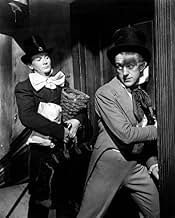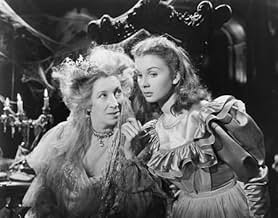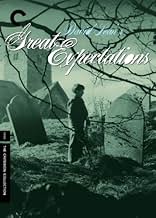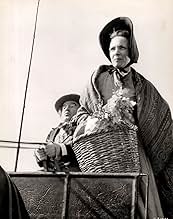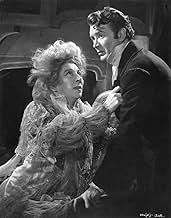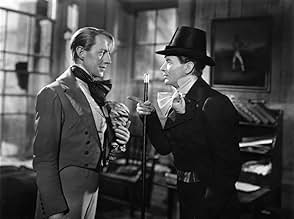VALUTAZIONE IMDb
7,8/10
27.550
LA TUA VALUTAZIONE
Un umile orfano diventa improvvisamente un gentiluomo con l'aiuto di un benefattore sconosciuto.Un umile orfano diventa improvvisamente un gentiluomo con l'aiuto di un benefattore sconosciuto.Un umile orfano diventa improvvisamente un gentiluomo con l'aiuto di un benefattore sconosciuto.
- Regia
- Sceneggiatura
- Star
- Vincitore di 2 Oscar
- 11 vittorie e 4 candidature totali
Tony Wager
- Young Pip
- (as Anthony Wager)
O.B. Clarence
- The Aged Parent
- (as O. B. Clarence)
Recensioni in evidenza
The Dickens novel is given classic treatment in David Lean's "Great Expectations". The opening scene is so atmospheric it sets the tone for the convoluted story to follow. The earlier scenes with young Pip are the most enjoyable for me--especially those involving Estella (Jean Simmons) and Miss Havisham (Martita Hunt).
Brilliant performances from all concerned. John Mills is wholly satisfying as the adult Pip and Valerie Hobson as the adult Estella--but it is Martita Hunt's Miss Havisham, sitting among the ruined finery of a wedding that never took place, everything exactly the way it was on that fateful day--and waging war on men ever since--that lingers in the memory.
Some of the best black and white photography seen until that time and an absorbing story with twists and surprises that have logical explanations. Compares favorably with the other great British film, "Oliver Twist" and, by all means, recommended viewing.
Not only worthy of its Best Picture nomination, it should have won over "Gentleman's Agreement" which now seems preachy and artificial.
Brilliant performances from all concerned. John Mills is wholly satisfying as the adult Pip and Valerie Hobson as the adult Estella--but it is Martita Hunt's Miss Havisham, sitting among the ruined finery of a wedding that never took place, everything exactly the way it was on that fateful day--and waging war on men ever since--that lingers in the memory.
Some of the best black and white photography seen until that time and an absorbing story with twists and surprises that have logical explanations. Compares favorably with the other great British film, "Oliver Twist" and, by all means, recommended viewing.
Not only worthy of its Best Picture nomination, it should have won over "Gentleman's Agreement" which now seems preachy and artificial.
I read the novel decades ago, but from what I remember the major points and most of the minor points of the novel are intact. The novel and the film weave a tale of a 19th century England completely lacking in compassion, and that always went doubly so for orphans such as Pip, yet he does encounter more than his share of good luck.
Of course the most interesting character in the novel is Miss Haversham. In the film as in the novel she is dumped at the altar on her wedding day in her youth and has harbored a grudge against the entire male sex since then and has lived as though stuck in that day for decades, still wearing her rotting wedding dress. What I don't understand is why the film does not include her being financially defrauded by her fiance as the novel does. The novel weaves a tale of an unbelievably small world, but the film omits a couple of the more unbelievable plot turns to its credit.
The lawyer, Mr. Jaggers, who attends to Pip's affairs when he is in London, is also a most interesting character. He has a hangman's noose as a souvenir in his office and also seems to be actively collecting the death masks of the recently executed as a new one pops up every time Pip visits him. Yet when he discusses the matter of the death penalty and criminal justice in England Jaggers truly seems to get the cruel randomness of those institutions.
One thing I can say without spoiling anything is how completely unrecognizable Alec Guinness is as Herbert Pocket, Pip's roommate in London. He doesn't even have that trademark gravelly voice at this point, his first credited film appearance.
I don't even like costume dramas or period pieces, but I highly recommend this one. The fine acting by the cast and Lean's direction really drew me into the story.
Of course the most interesting character in the novel is Miss Haversham. In the film as in the novel she is dumped at the altar on her wedding day in her youth and has harbored a grudge against the entire male sex since then and has lived as though stuck in that day for decades, still wearing her rotting wedding dress. What I don't understand is why the film does not include her being financially defrauded by her fiance as the novel does. The novel weaves a tale of an unbelievably small world, but the film omits a couple of the more unbelievable plot turns to its credit.
The lawyer, Mr. Jaggers, who attends to Pip's affairs when he is in London, is also a most interesting character. He has a hangman's noose as a souvenir in his office and also seems to be actively collecting the death masks of the recently executed as a new one pops up every time Pip visits him. Yet when he discusses the matter of the death penalty and criminal justice in England Jaggers truly seems to get the cruel randomness of those institutions.
One thing I can say without spoiling anything is how completely unrecognizable Alec Guinness is as Herbert Pocket, Pip's roommate in London. He doesn't even have that trademark gravelly voice at this point, his first credited film appearance.
I don't even like costume dramas or period pieces, but I highly recommend this one. The fine acting by the cast and Lean's direction really drew me into the story.
Charles Dickens certainly liked to write his novels from a child's point of view. Oliver Twist, David Copperfield, and Great Expectations all start with the hero/protagonist as a child. Only young Oliver Twist of the three I mentioned ended still a child in the novel's conclusion. In Oliver Twist, young Oliver is reunited with his propertied and somewhat wealthy grandfather looking to rise in station from his humble background.
Young Pip, short for Philip Pirrup, is also of humble background in Great Expectations. His parents are killed when he's young, he lives with his sister and her husband who is a blacksmith. During his childhood he befriends a convict on the run. Later on for mysterious reasons to him, he comes under the protection of eccentric old Miss Haversham who wants him as a companion for her adopted child Estella.
Later on as an adult, he has a mysterious benefactor who provides him income enough to live as a gentlemen, something he fervently desired all his life. It seems to be a dream come true. But there are still quite a few bumps on Pip's road of life.
Charles Dickens despaired of the poverty he saw in early Victorian Great Britain. But he also knew that riches alone did not necessarily guarantee happiness. It didn't for Scrooge, for Ms. Havisham, and certainly not for John Mills as the adult Pip. Nor does it for Valerie Hobson who inherits Ms. Havisham's estate.
Mills and Hobson are a perfectly cast pair of leads in this version of Great Expectations. Alec Guinness began a long association with director David Lean as Herbert Pocket, Pip's friend and roommate.
Finlay Currie, the craggy Scot's player who usually played kindly old gentlemen, turns out to be kinder indeed than originally presented as convict Abel Magwitch. It's a different kind of part for him.
Martita Hunt as Ms. Havisham plays a part all to familiar to me. I had an elderly relative in my family a lot like her, bitter at the world and taking it out on all around her.
My favorite in the film though is Francis L. Sullivan. Usually Sullivan's characters are crooked and/or corrupt in most of his films. As attorney Jaggers who seems to have an unseen hand in all the proceedings he actually is working for the ultimate benefit of both of our leads.
In Dickens's world, wealth can corrupt as easily as poverty. It's the character inside you that counts and that fact is not better demonstrated than in this adaption of Great Expectations.
Young Pip, short for Philip Pirrup, is also of humble background in Great Expectations. His parents are killed when he's young, he lives with his sister and her husband who is a blacksmith. During his childhood he befriends a convict on the run. Later on for mysterious reasons to him, he comes under the protection of eccentric old Miss Haversham who wants him as a companion for her adopted child Estella.
Later on as an adult, he has a mysterious benefactor who provides him income enough to live as a gentlemen, something he fervently desired all his life. It seems to be a dream come true. But there are still quite a few bumps on Pip's road of life.
Charles Dickens despaired of the poverty he saw in early Victorian Great Britain. But he also knew that riches alone did not necessarily guarantee happiness. It didn't for Scrooge, for Ms. Havisham, and certainly not for John Mills as the adult Pip. Nor does it for Valerie Hobson who inherits Ms. Havisham's estate.
Mills and Hobson are a perfectly cast pair of leads in this version of Great Expectations. Alec Guinness began a long association with director David Lean as Herbert Pocket, Pip's friend and roommate.
Finlay Currie, the craggy Scot's player who usually played kindly old gentlemen, turns out to be kinder indeed than originally presented as convict Abel Magwitch. It's a different kind of part for him.
Martita Hunt as Ms. Havisham plays a part all to familiar to me. I had an elderly relative in my family a lot like her, bitter at the world and taking it out on all around her.
My favorite in the film though is Francis L. Sullivan. Usually Sullivan's characters are crooked and/or corrupt in most of his films. As attorney Jaggers who seems to have an unseen hand in all the proceedings he actually is working for the ultimate benefit of both of our leads.
In Dickens's world, wealth can corrupt as easily as poverty. It's the character inside you that counts and that fact is not better demonstrated than in this adaption of Great Expectations.
As a fan of many so-called classic films, I am nonetheless aware that there is some validity to the criticism that early movies (say, anything before Brando in Streetcar) as a rule have less vitality than their modern counterparts, are formulaic to a fault, and strain the limits of modern attention spans more than can be fully blamed on the viewer. Great Expectations treads miles clear of any of these criticisms, and so I recommend it in particular to anyone who has a general disdain for films that a) were released in the first half of the 20th century and/or b) were shot in black and white. Here is one that can change your mind.
Naturally, given the talents of the author, the plot itself leaves little to be desired. Further, David Lean, his cast, and his crew, have done a splendid job translating Dickens to the screen. This is indeed, as the Criterion Collection folks have classified it, one of the "Great Adaptations." I doubt that there is a better cinematic adaptation of any Dickens novel and am almost certain there is none in which the Dickensian English dialogue flows more pleasantly and naturally. The actors herein deliver Dickens as Olivier himself delivered Shakespeare. Nor is this an unimportant accomplishment; having to spend a couple of hours listening to actors who sound more like they are delivering a series of quotes (though admittedly they are) than that they are actually conversing can be positively unbearable. Indeed I think that's the main thing that people are hitting upon when, with broad brush-strokes, they paint older films as tedious. Great Expectations is the antidote to just this attitude.
If you are a lover of classic films, you have likely already seen this one or will do so regardless of my review, but if, on the other hand, you entertain the possibility of watching Great Expectations with a deep-seated skepticism I implore you to give it a chance. I have every confidence you'll be pleasantly surprised and find yourself drawn into what is, after all, a fascinating story.
Naturally, given the talents of the author, the plot itself leaves little to be desired. Further, David Lean, his cast, and his crew, have done a splendid job translating Dickens to the screen. This is indeed, as the Criterion Collection folks have classified it, one of the "Great Adaptations." I doubt that there is a better cinematic adaptation of any Dickens novel and am almost certain there is none in which the Dickensian English dialogue flows more pleasantly and naturally. The actors herein deliver Dickens as Olivier himself delivered Shakespeare. Nor is this an unimportant accomplishment; having to spend a couple of hours listening to actors who sound more like they are delivering a series of quotes (though admittedly they are) than that they are actually conversing can be positively unbearable. Indeed I think that's the main thing that people are hitting upon when, with broad brush-strokes, they paint older films as tedious. Great Expectations is the antidote to just this attitude.
If you are a lover of classic films, you have likely already seen this one or will do so regardless of my review, but if, on the other hand, you entertain the possibility of watching Great Expectations with a deep-seated skepticism I implore you to give it a chance. I have every confidence you'll be pleasantly surprised and find yourself drawn into what is, after all, a fascinating story.
Few directors have ever matched David Lean's ability to bring great literary works to life on film, and this is one of his best productions. The Dickens novel itself is so good that even routine film adaptations of it are usually quite watchable, but this version is exceptional, with atmosphere, settings, photography, and characters that do full justice to the original. From the very beginning, with a wonderful realization of the graveyard scene, you are drawn into the world of Pip and the other characters, and feel that you can understand their concerns and dilemmas.
One of the things that makes "Great Expectations" such a classic story is that it adds some real depth to Dickens's usual slightly exaggerated characters, so that they are both memorable and thought-provoking. Characters such as Miss Havisham and Magwitch are interesting in their own right, besides serving as vital influences on Pip's life. Here the fine cast and directing help to realize the potential of the characters, making for an interesting story that also has some things to say. John Mills brings out Pip's innocence and earnestness very believably, and the supporting cast works quite well too. Some of them seem to be almost exactly what Dickens would have envisioned, such as Jean Simmons as the young Estella and Francis Sullivan as Jaggers (a role he also played in an earlier version).
This is exactly what a film version of a classic book should be, keeping the most important themes and events from the story and using the visuals to bring its world to life. It's an excellent movie that is enjoyable and nicely done in every respect.
One of the things that makes "Great Expectations" such a classic story is that it adds some real depth to Dickens's usual slightly exaggerated characters, so that they are both memorable and thought-provoking. Characters such as Miss Havisham and Magwitch are interesting in their own right, besides serving as vital influences on Pip's life. Here the fine cast and directing help to realize the potential of the characters, making for an interesting story that also has some things to say. John Mills brings out Pip's innocence and earnestness very believably, and the supporting cast works quite well too. Some of them seem to be almost exactly what Dickens would have envisioned, such as Jean Simmons as the young Estella and Francis Sullivan as Jaggers (a role he also played in an earlier version).
This is exactly what a film version of a classic book should be, keeping the most important themes and events from the story and using the visuals to bring its world to life. It's an excellent movie that is enjoyable and nicely done in every respect.
Lo sapevi?
- QuizSir Alec Guinness admired the way Sir David Lean directed him, singling out a close-up in which he had to laugh out loud, and which he struggled to make look unmanufactured. Lean told him to forget about the whole thing, sat by his side, and made a little signal to the camera to start turning in the course of the conversation. He said something which made Guinness laugh and then said, "Cut." Guinness: "So he got this shot on a totally false premise, but thank God. I don't think I would have ever achieved it otherwise."
- BlooperAt the end, when Pip is persuading Estella to leave Satis House with him, a 'Chad' is clearly visible drawn on the screen behind him (Chads were a popular form of graffiti in the 1940s - a character with a big nose looking over a wall). Chad is a British term; the American equivalent would be Kilroy, as in 'Kilroy was here'.
- Curiosità sui creditiThe identity of the actress playing Molly is never revealed, because this would constitute a spoiler.
- Versioni alternativeIn some prints, after the fifteen minute "convict episode" at the beginning of the film ends, a voice-over by the adult Pip (John Mills) says, "it was a year later", as Mrs. Joe arrives home in the carriage. As now usually shown, there is no voice-over in this sequence.
- ConnessioniFeatured in Moscow in Madrid (1965)
I più visti
Accedi per valutare e creare un elenco di titoli salvati per ottenere consigli personalizzati
Dettagli
- Data di uscita
- Paese di origine
- Sito ufficiale
- Lingua
- Celebre anche come
- Grandes esperanzas
- Luoghi delle riprese
- St Mary's Marshes, Kent, Inghilterra, Regno Unito(opening sequence - Pip and Herbert Pocket ride in rowboat)
- Azienda produttrice
- Vedi altri crediti dell’azienda su IMDbPro
Botteghino
- Budget
- 350.000 £ (previsto)
- Lordo in tutto il mondo
- 33.408 USD
- Tempo di esecuzione1 ora 58 minuti
- Colore
- Proporzioni
- 1.37 : 1
Contribuisci a questa pagina
Suggerisci una modifica o aggiungi i contenuti mancanti

Divario superiore
By what name was Grandi speranze (1946) officially released in India in Hindi?
Rispondi

